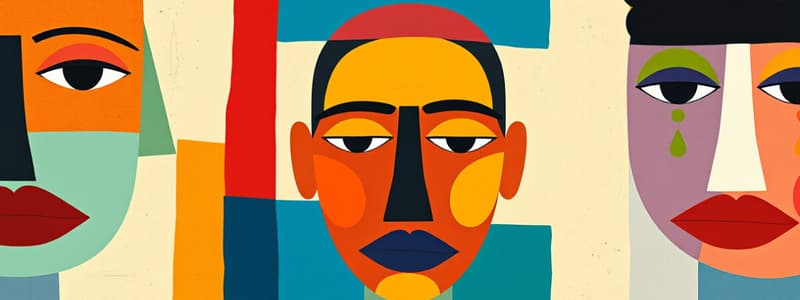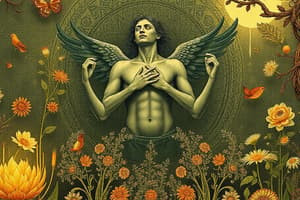Podcast
Questions and Answers
What is the primary focus of anthropology?
What is the primary focus of anthropology?
- The evaluation of economic impacts on societies
- The integrated study of biological, cultural, and social aspects of humans (correct)
- The systematic study of human behavior in groups
- The study of political systems and government structures
How does sociology primarily differ from anthropology?
How does sociology primarily differ from anthropology?
- Sociology focuses solely on political behavior
- Sociology integrates cultural aspects while anthropology does not
- Sociology is only concerned with economic factors
- Sociology studies human social life and interactions rather than biological aspects (correct)
According to the definition provided, what encompasses culture?
According to the definition provided, what encompasses culture?
- Shared knowledge, customs, language, and material artifacts (correct)
- Only the explicit beliefs and customs of a society
- The genetic inheritance of a community over generations
- The legal frameworks established by governments
What does political science primarily study?
What does political science primarily study?
Which of the following best describes the term 'society' as mentioned?
Which of the following best describes the term 'society' as mentioned?
What role do social sciences play in understanding perspectives?
What role do social sciences play in understanding perspectives?
What is a common misconception about culture?
What is a common misconception about culture?
Which statement reflects a misunderstanding of sociology?
Which statement reflects a misunderstanding of sociology?
What is one of the primary functions of culture in society?
What is one of the primary functions of culture in society?
Which of the following best describes norms in a culture?
Which of the following best describes norms in a culture?
What aspect of culture refers to principles that guide behavior?
What aspect of culture refers to principles that guide behavior?
How is culture typically transmitted among members of a society?
How is culture typically transmitted among members of a society?
What does it mean when culture is described as 'continuous and cumulative'?
What does it mean when culture is described as 'continuous and cumulative'?
Which of the following statements regarding beliefs is true?
Which of the following statements regarding beliefs is true?
Which of the following is an example of a social institution?
Which of the following is an example of a social institution?
Which of the following aspects of culture encompasses creativity and artistic expression?
Which of the following aspects of culture encompasses creativity and artistic expression?
What element of society determines how individuals fit into the larger group?
What element of society determines how individuals fit into the larger group?
Which type of society is characterized by urbanization and industrialization?
Which type of society is characterized by urbanization and industrialization?
What do social norms provide within a society?
What do social norms provide within a society?
Which society relies on hunting, fishing, and foraging for survival?
Which society relies on hunting, fishing, and foraging for survival?
Social hierarchies rank individuals based on which of the following?
Social hierarchies rank individuals based on which of the following?
What distinguishes a postindustrial society from a traditional society?
What distinguishes a postindustrial society from a traditional society?
Which of these is considered a social institution?
Which of these is considered a social institution?
What is a key characteristic of agrarian societies?
What is a key characteristic of agrarian societies?
What is a key characteristic of modern society?
What is a key characteristic of modern society?
Which of the following best describes the term 'Political Participation'?
Which of the following best describes the term 'Political Participation'?
What is meant by 'Political Culture'?
What is meant by 'Political Culture'?
Which political ideology is primarily associated with high levels of trust in government?
Which political ideology is primarily associated with high levels of trust in government?
What are the characteristics of an Authoritarian Political Culture?
What are the characteristics of an Authoritarian Political Culture?
Democracy is characterized by which of the following principles?
Democracy is characterized by which of the following principles?
How does Political Ideology influence governance?
How does Political Ideology influence governance?
What type of political culture would likely support high taxes for extensive public services?
What type of political culture would likely support high taxes for extensive public services?
What does the American flag symbolize?
What does the American flag symbolize?
Which of the following best describes ethnocentrism?
Which of the following best describes ethnocentrism?
What is a consequence of ethnocentrism?
What is a consequence of ethnocentrism?
What characterizes the hippie movement of the 1960s?
What characterizes the hippie movement of the 1960s?
What does xenocentrism signify?
What does xenocentrism signify?
How can one stop ethnocentric behavior?
How can one stop ethnocentric behavior?
What is a psychological aspect of xenophobia?
What is a psychological aspect of xenophobia?
Which of the following defines a society?
Which of the following defines a society?
Flashcards are hidden until you start studying
Study Notes
Identity
- Identity is defined by distinctive characteristics shaped by group membership.
- It encompasses individual traits influenced by culture, society, and politics.
Social Sciences
- Social sciences study culture, society, and politics, represented by anthropology, sociology, and political science.
Anthropology
- Systematic study of biological, cultural, and social aspects of humans.
- Derived from Greek: "Anthropos" (man) and "logos" (study or inquiry).
- Integrates biological sciences and humanities to understand human complexity across cultures.
Sociology
- Defined by Anthony Giddens as the study of human social life, groups, and society.
- Explores individual and group behavior through economic, political, and social factors.
Political Science
- Systematic study of politics, described by Andrew Heywood.
- Focuses on values of equality, freedom, and justice and examines conflicts, resolutions, and cooperation.
Culture
- Culture refers to shared knowledge that shapes behavior and experiences.
- Includes explicit values and beliefs, implicit assumptions, customs, practices, and artifacts passed down generations.
Society
- Society consists of social actions, cultural practices, and political realities.
- Functions as a framework within which culture develops and individuals interact.
Cultural Variations
- Examples of cultural dress: Hanfu from the Tang Dynasty, Sari, and Filipiniana dress.
- Body language differs across cultures, reflecting unique social norms.
Aspects of Culture
- Culture is social, variable, shared, learned, transmitted, continuous, and gratifying.
- Values: Standards of behavior and judgments about what is important.
- Beliefs: Accepted truths or convictions, often based on traditions or experiences.
- Norms: Accepted behaviors in society, including greetings (e.g., handshakes).
- Language and Communication: Methods of conveying ideas (e.g., bowing for respect).
- Art and Aesthetics: Creative expressions like classical music or calligraphy.
- Social Institutions: Structures like family, education, religion, and government that organize societies.
- Technology and Material Culture: Modern tools and artifacts, such as smartphones.
- Cultural Symbols: Objects with significant meanings (e.g., the American flag symbolizing patriotism).
- Cultural Identity: How individuals identify themselves within cultural contexts.
Types of Culture
- Counterculture: Movements rejecting mainstream norms, such as the hippie movement of the 1960s.
Ethnocentrism vs. Xenocentrism
- Ethnocentrism: Viewing other cultures as inferior against one's own (e.g., criticizing indigenous lifestyles).
- Functions: Reinforces group solidarity, hinders understanding, can lead to social change.
- Xenocentrism: Preference for foreign values or products, often undermining local culture (e.g., seeking imported goods).
Society
- Society comprises individuals sharing interactions, relationships, and a sense of belonging.
- Organized patterns of relationships, structures, and social hierarchies influence social dynamics.
Aspects of Society
- Social Structure: Organized relationships determining individuals' roles.
- Social Institutions: Established systems (e.g., family, religion) structuring life.
- Social Norms: Accepted behaviors guiding actions in various situations.
Types of Society
- Hunting and Gathering: Nomadic groups relying on foraging.
- Agrarian Society: Settled communities with agricultural economies.
- Industrial Society: Focus on urbanization and complex social structures.
- Postindustrial Society: Emphasis on information and services rather than manufacturing.
Politics
- Politics encompasses governance, power dynamics, and decision-making processes.
- Involves competition, negotiation, and cooperation among individuals and groups.
Aspects of Politics
- Government: Institutions making and enforcing laws.
- Power: Ability to influence others’ behaviors.
- Political Ideologies: Systems of belief guiding societal organization.
- Public Policy: Government actions addressing societal issues.
- Political Participation: Citizen involvement in political processes.
- Political Culture: Shared beliefs regarding government roles.
Political Cultures
- Nordic Political Culture: Emphasizes equality and strong government involvement.
- Authoritarian Political Culture: Centralized control with limited freedoms.
Types of Politics
- Democracy: Power vested in the people through elected representatives.
Studying That Suits You
Use AI to generate personalized quizzes and flashcards to suit your learning preferences.




